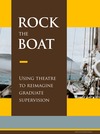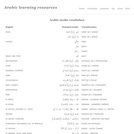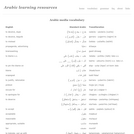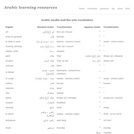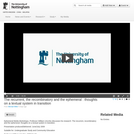Using Theatre to Reimagine Graduate Supervision
Short Description:
Rock the Boat is an open-access multimedia resource designed to provoke dialogue about graduate supervision relationships within universities, and their impact on student and faculty wellbeing. Drawing upon the tradition of Research-based Theatre, Rock the Boat draws attention to graduate supervision as a vital form of pedagogy, and as rife with challenges — especially relating to equity, inclusion and diversity.
Long Description:
Drawing upon the tradition of Research-based Theatre, Rock the Boat draws attention to graduate supervision as a vital form of pedagogy, and as rife with challenges — especially relating to equity, inclusion and diversity. By supporting structured and safe dialogue about some of these challenges on campus, we hope to support students, faculty and staff in developing healthy, respectful supervisory relationships, thereby enhancing the wellbeing of all.
The resource comprises four filmed scenes, each seven to 10 minutes long: Zoom Fatigue, Contentious Authorship, No Other Choice and Disclosures. Each scene dramatizes a relationship between one or more graduate students and their supervisors and provokes dialogue around specific challenges that can occur. These include supervisory communication, authorship of scientific papers, competition between students, gender and racial discrimination, balancing personal and professional priorities, mental health and privacy.
The scenes can be used in any facilitated group context. You may, for example, wish to use them for graduate student orientation, during equity, diversity and inclusion workshops, for supervisory training sessions, or during faculty or departmental retreats. The scenes are professionally acted and filmed, and this guide will help you design and facilitate a group session that generates useful dialogue, whatever your specific goals.
Word Count: 10093
(Note: This resource's metadata has been created automatically by reformatting and/or combining the information that the author initially provided as part of a bulk import process.)

